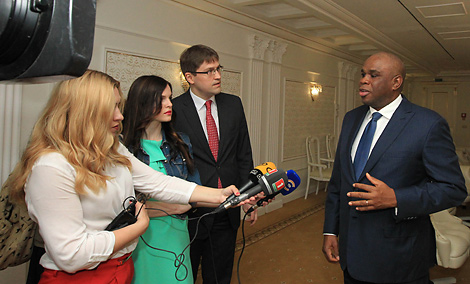Business news
Afreximbank to provide $150m credit line for acquisition of Belarusian goods
 MINSK, 6 June (BelTA) - The African Export-Import Bank (Afreximbank) will open a $150 million credit line for the acquisition of Belarusian goods, Chairman of the Board of Directors of the African Export–Import Bank Benedict Oramah told the media ahead of the first Belarusian-African forum Belarus and Africa: New Frontiers on 6 June, BelTA has learned.
MINSK, 6 June (BelTA) - The African Export-Import Bank (Afreximbank) will open a $150 million credit line for the acquisition of Belarusian goods, Chairman of the Board of Directors of the African Export–Import Bank Benedict Oramah told the media ahead of the first Belarusian-African forum Belarus and Africa: New Frontiers on 6 June, BelTA has learned.
In his words, a framework agreement between the Development Bank of the Republic of Belarus and the African Export-Import Bank will be signed at the forum. “This agreement is in fact an agreement on a $150 million credit line. This will be a continuation of our dialogue which started last year during my visit to Belarus. Back then, we agreed with the Development Bank to promote the financing of trade between Belarus and the African countries. The total potential of such financing was then estimated at $800 million. The agreement we are going to sign is the first step towards the goal,” he stressed.
According to the chairman of the Afreximbank board, the agreement will help step up mutual trade. “The document will be a so-called corridor for Belarusian goods to the African continent. In general, we are setting an ambitious task of increasing the trade between Belarus and the African countries to $3 billion by 2020,” stressed Benedict Oramah.
During the last year’s visit to Belarus, Afreximbank and the Development Bank agreed to reserve certain limits of funds. “These will be some $400 million from us and the same amount from Belarus. They are needed to boost mutual trade between our countries. This first $150 million will be mainly used to purchase Belarusian equipment for the developing African market,” said Benedict Oramah.
The first Belarusian-African forum is held on 6-7 June as part of the Belarusian agro-industrial week Belagro 2017. Taking part in the forum are the Development Bank of the Republic of Belarus and the African Export–Import Bank. The event is aimed at promoting cooperation in the agricultural and industrial sectors. The number of participants from the African countries exceeded 70 representatives, including the agriculture ministers of Angola, Namibia and Uganda, the industry minister of Angola, the finance minister of Togo, the leadership of the African Export–Import Bank, other banking structures of Africa, the president of the National African Farmers Union, representatives of Africa’s biggest companies.







 print version
print version make home page
make home page add to bookmarks
add to bookmarks

